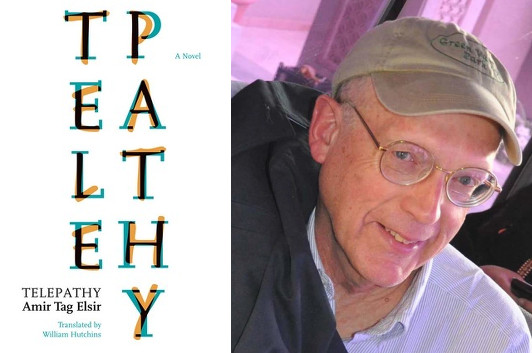William Hutchins and Amir Tag Elsir

photo: Nimah Ismail Nawwab
A famous Sudanese writer meets an annoyingly odd man at the signing for his latest novel; later, having been dragged to a lecture he doesn’t particularly care to attend, that writer sneaks out for a smoke break, only to encounter the same man—and to discover that he has the same, rather uncommon, name as a character in his book. That’s the set-up for Telepathy, the new novel from the Sudanese novelist Amir Tag Elsir, which has been translated for English-language readers by William Hutchins, who’s perhaps best known to American audiences for his translation of Nobel laureate Naguib Mahfouz’s Cairo Trilogy. And if you think you know where that set-up might be headed, you might want to think again… although, since it’s a rather short novel, it won’t take you very long to find out for yourself!
The contemporary Sudanese author Amir Tag Elsir has a gift for writing genuinely amusing and humane novels about topics like Ebola and ethnic tension in Sudan. Not gallows humor, his novels are full of antic, frolicsome wit. With carefully observed and meticulously described observations of life in Port Sudan or Khartoum, he builds hard-to-refute cases for our generic silliness, which we should embrace to achieve our full potential as human beings.
When one of Tag Elsir’s novels was short-listed for the International Prize for Arabic fiction for 2011, Samuel Shimon of Banipal, a magazine of modern Arab literature, asked me to translate an excerpt from it. That opportunity inspired me to translate the entire novel, which was published in 2012 as The Grub Hunter by Pearson Education Limited for a temporarily revived Heinemann African Writers Series, which had once published books by Tag Elsir’s late uncle, Tayeb Salih, a much admired Sudanese author. In The Grub Hunter, a police officer who once jailed subversive writers decides to write a novel himself after losing his job and a leg in a stakeout.
I also translated Amir Tag Elsir’s French Perfume for the ANTIBOOKCLUB of New York, and in March 2016 it was named to the Best Translated Book Award Fiction Longlist. French Perfume tells the story of a marginal slum’s self-appointed herald who reinvents himself when he learns a Frenchwoman may come to reside in his community as part of some international project. He falls madly in love with her internet profile, which is relayed to him by a local teenager, who has learned how to surf the web.
Sufism, Islamic mysticism, has provided literary inspiration for many Arab authors who themselves may not have been Sufi practitioners. Sudan has a rich Sufi heritage that is evident both in the name Tag Elsir and in the novel French Perfume, which can be read as an updated version of the romance between an ancient Arab poet, Majnun, who lost his mind but gained gnosis through his thwarted love for beautiful Layla. Ali Jarjar, the transformed busybody, re-enacts Majnun’s tragedy as he waits and waits for the Frenchwoman to arrive.
Telepathy is thus the third novel by Amir Tag Elsir I have translated. I was fortunate to meet him in Doha, Qatar, where he has a day-job as a physician, when I attended the book launch for Gathering the Tide: An Anthology of Contemporary Arabian Gulf Poetry. As a physician, Amir Tag Elsir is able to write accurately about maladies and the way they shape his characters’ lives. In Telepathy, for example, at least two characters suffer from chronic conditions that help to determine their destinies.
Thalia Suzuma and Mayada Ibrahim were the editors for Telepathy for the Bloomsbury Qatar Foundation, which also released the novel in Arabic as Taqs, which means “ritual.” They humored me after an earnest copy editor Anglicized my entire translation; so I was able to resurrect my version. Would it have been possible to coordinate the editing of the Arabic and English texts?
Telepathy has a surprise ending that arrives in its final paragraph. It is an O. Henry ending and also an Aristotelian one. In his Poetics, Aristotle wrote that the three parts for an excellent Greek tragedy’s plot are reversal, recognition, and suffering. Telepathy supplies these in its final paragraph but also in an even more moving scene when the hero attends a funeral not only for a woman but for his dreams.
One other Aristotelian box Tag Elsir checks is character, in Aristotle’s sense—an explanation of the reasons for the hero’s actions. In Telepathy, a successful Sudanese author prides himself on his special ritual for writing and on the exotic details he can add, like a special spice blend, to his works—thanks to trips to countries like Malaysia. His happy self-confidence is disturbed when a character from his latest novel apparently comes to life, either because a scam-artist is stalking him or because the novelist unconsciously received his latest novel, including all its special spices, telepathically. As the author tries to do the right thing for an incarnated character, his own reasons for his actions are fully explored.
17 April 2016 | in translation |

 Our Endless and Proper Work is my new book with Belt Publishing about starting (and sticking to) a productive writing practice.
Our Endless and Proper Work is my new book with Belt Publishing about starting (and sticking to) a productive writing practice. 
